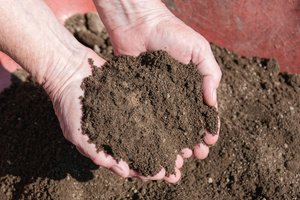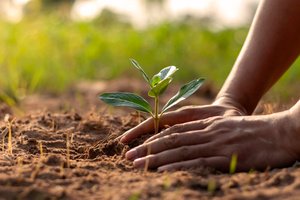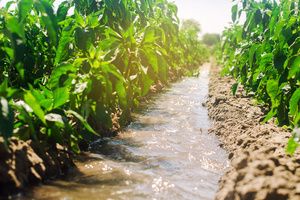No matter what type of landscaping or gardening project you undertake, starting with the right type of soil is crucial. Whether you are hoping to grow a lush green lawn, a bountiful organic vegetable garden, or simply level out your yard, you need to use an appropriate type of soil to get the best results.
One decision that you will need to make is whether to get screened or unscreened topsoil. Here is a look at the characteristics of these types of soil and what you should consider before making your choice.
What Makes Topsoil Different?

First, it is important to understand the distinction between topsoil and other types of dirt. Most types of dirt can be purchased in either screened or unscreened varieties, but topsoil is a specific type of soil. It is the topmost layer of soil in the ground and is the place where sunlight helps plants grow, water is absorbed, and nutrients are delivered to the plants. This is also the part of the ground where microorganisms may interact with plants to allow them to grow and thrive.
Once soil has been used to plant something, it may become depleted of nutrients. As a result, finding natural topsoil can be challenging. Commercially produced topsoil is designed to meet the demand for nutrient-dense soil to start gardens. Commercial topsoil normally contains organic material and is developed with the proper moisture rates and pH levels in mind for growth. Consumers normally combine topsoil with the upper layer of their existing soil to a depth of a couple of inches.
Screened Vs Unscreened Topsoil
Topsoil is available in many varieties, but the first decision that gardeners must make is whether they need topsoil that is screened or unscreened. Here is a look at what sets these two categories apart.
Particle Size
Screened topsoil is run through mesh in order to break it down into particles that bear a small, inconsistent size. Those who are looking for screened topsoil can choose from a range of sizes, but the most popular sizes of mesh openings used for screening are 5/8 or 3/4 of an inch.
During the screening process, sticks, clumps, rocks and other matter larger than the screen will be filtered out. The number to which the dirt has been screened will tell you how large the particles are; topsoil that was screened to 5/8 of an inch should not contain any pieces that are larger in diameter than 5/8 of an inch.
Unscreened soil is topsoil in its more natural state and typically contains a mixture of larger and smaller particles. It can be difficult to predict the size of particles in unscreened topsoil, so those who need greater control over particle size should choose screened topsoil.
Usage

Affordable unscreened topsoil is suitable for elevated and bigger landscaping features as well as subsoil bases that will eventually be topped with finer soil to grow a garden. However, because of its inconsistent particle size, unscreened topsoil is not suitable for flower beds or vegetable gardens. The bigger particles in unscreened topsoil make it difficult for roots to grow and can even prevent nutrients from reaching the roots of the plant.
Screened topsoil, in contrast, has a finer texture that facilitates the flow of nutrients to the roots of the plant. This makes it a good choice for gardens where soil is low in nutrients due to past use. It can also help to freshen up ground that has become filled with weeds and stones as a result of rotating.
Price
Because less work is involved in producing it, unscreened topsoil tends to be far more affordable than screened topsoil. In fact, some home gardeners purchase unscreened topsoil and screen it themselves using a mesh screening dish to free up more money in their gardening budget for higher-quality seeds. However, this may be impractical if significant volumes of topsoil need to be screened at home.
For those who wish to screen their own topsoil, the process is very simple. Topsoil is placed into the mesh screening dish and shaken until all of the soil sieves through it. It is a good idea to place a wheelbarrow underneath the screening dish to catch screened soil. Clumps, rocks and other debris will stay in the dish, while the screened topsoil will filter through below. In cases where very fine topsoil is needed, it can be screened again using a mesh screening dish that features even smaller gaps.
When purchasing screened topsoil, keep in mind that its price goes up as the screening size becomes finer.
Water Flow

Unscreened topsoil contains particles of different shapes and sizes. This can cause water to become trapped between its particles, eventually leading to plant damage such as root rot. This is another reason that unscreened topsoil is not recommended for flower or vegetable gardens.
The uniform size and general loose nature of screened topsoil gives it optimal drainage properties, making it the best choice for gardens that are prone to drainage problems, such as soils with a heavy percentage of clay.
Ease of Manipulation
Because screened topsoil is looser and softer than its unscreened counterpart, it is easier to manipulate. Therefore, it is well suited to garden beds and other smaller spaces. In addition, screened topsoil is far easier to amend uniformly if you need to incorporate products to enhance its health such as fertilizer, compost or lime.
Gardeners may run into difficulties when working with unscreened topsoil as the bigger rocks found within it could damage their gardening tools. Unscreened topsoil is also a poor choice for installing sod because it can be difficult to rake and grade it smoothly to install an even lawn.
Reach Out to the Soil Professionals
To obtain screened or unscreened dirt of any size for your landscaping and gardening projects, reach out to the professionals at Dirt Connections. We deliver high-quality soil and dirt to residential and commercial sites throughout the Northern Virginia area.
Summary

Dirt Connections was started with one goal in mind: providing quality residential and commercial construction services to clients on time and on budget. Reach out for more information on how we can support your next project.
For your convenience our estimates are free and by appointment. Call 703-940-9949 for a free estimate today!










































